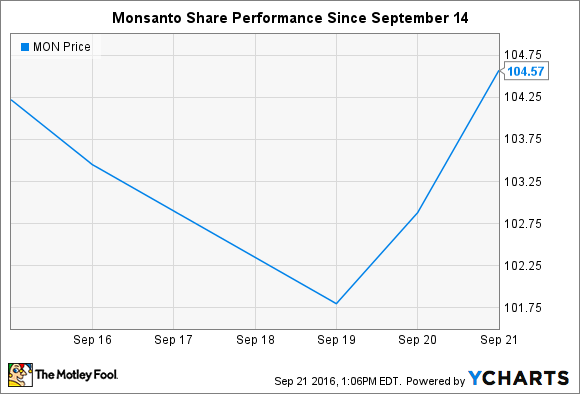
Image source: Getty Images.
I suspect that the unfortunate reputation of Monsanto (NYSE: MON) , whether deserved or not, was behind the flurry of non-financial coverage of the recently announced merger agreement with Bayer (NASDAQOTH: BAYRY) . Perhaps because of that, most articles forgot to mention that not all acquisitions are approved by regulators, while others are abandoned by executives months later when the road to approval proves more difficult than originally envisioned.
Although regulators have yet to weigh in on the matter, investors appear skeptical that a Monsanto-Bayer merger will occur. There are several good reasons for the pessimism.
What’s going on?
The deal was announced on Sept. 14. Bayer agreed to an all-cash offer at $ 128 per share of Monsanto stock, for a total cash payment of $ 57 billion. Assuming another $ 9 billion in Monsanto debt would raise the total acquisition price to $ 66 billion.
But Monsanto shares have barely budged since the deal was announced and continue to trade well below the $ 128 offer price. At $ 105 per share, Monsanto stock is trading 22% below the offer price. Rather than rise closer to Bayer’s offer (or at all), shares actually declined for several days after the announcement.
The large gap between Monsanto’s current share price and the offer price imply that investors are skeptical that the merger will take place. Why? Here are a few factors investors are chewing on:
- Bayer needs to take on debt: … a lot of debt. At the end of June the company had less than $ 2.25 billion in cash on hand. Worse yet, it had just $ 18.4 billion in long-term debt on its balance sheet. To close the deal Bayer shareholders need to be comfortable taking on $ 57 billion in debt just to buy Monsanto shares, and then an additional $ 9 billion in Monsanto debt. While the liabilities would be partially offset by adding Monsanto’s assets to the balance sheet, the end result is still a weaker balance sheet due to a higher debt-to-assets ratio. Bayer shareholders may not want to take on that risk.
- American regulators: Perhaps on its own a Monsanto-Bayer merger wouldn’t provoke an abnormal level of scrutiny, but regulators aren’t dealing with single merger in the agricultural industry; they’re dealing with three. And these three involve an overweight distribution of global market share. Dow Chemical Company and DuPont have a pending merger on the table (which was just delayed). ChemChina is still hoping to close its deal for Syngenta by the end of 2016 ( U.S. regulators already signed off on it ). The high tide of consolidation puts added pressure on regulators, who may rather avoid an overly concentrated industry.
- European regulators: The same is true for European regulators, although the road to approval is even more difficult when it travels through Brussels. In addition to stricter trust and enterprise laws, all member states of the European Union get to weigh in on the matter. Worse, unlike their American counterparts, they have yet to approve a single merger in the industry. Having three on the table could doom each in the end.
What does it mean for investors?
The good news is that even if the Monsanto-Bayer merger fails due to regulatory hurdles, Monsanto investors will be $ 2 billion richer thanks to a reverse antitrust break fee. There’s also plenty to look forward to in Monsanto’s pipeline, which bodes well for the future of the company. While it’s too early to tell when or if a deal will take place, it’s clear that investors are pretty skeptical.
A secret billion-dollar stock opportunity
The world’s biggest tech company forgot to show you something, but a few Wall Street analysts and the Fool didn’t miss a beat: There’s a small company that’s powering their brand-new gadgets and the coming revolution in technology. And we think its stock price has nearly unlimited room to run for early in-the-know investors! To be one of them, just click here .
Maxx Chatsko has no position in any stocks mentioned. Follow him on Twitter to keep up with developments in the engineered biology field.
The Motley Fool has no position in any of the stocks mentioned. Try any of our Foolish newsletter services free for 30 days . We Fools may not all hold the same opinions, but we all believe that considering a diverse range of insights makes us better investors. The Motley Fool has a disclosure policy .
The views and opinions expressed herein are the views and opinions of the author and do not necessarily reflect those of Nasdaq, Inc.
Plantations International
